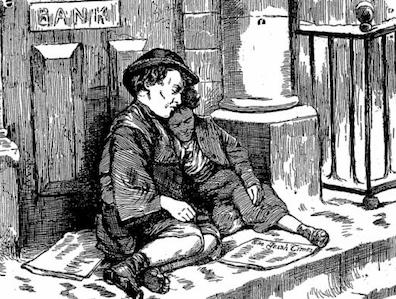
Illustration of two Irish newsboys in the 20 December 1884 issue of the Irish Times. Source: comeheretome.com.

Photograph of St. Louis, Missouri newsboys taken by Lewis Wickes Hine in 1910. Source: www.facebook.com.
Newsboys
The "newsboys" twice seen––and strongly heard––in Aeolus
were a prominent part of English, Irish, and American city
life in the late 19th and early 20th centuries. They
exemplified capitalism in action, both in the newspapers'
exploitation of poor boys to distribute their products and in
the boys' energetic determination to escape brutal
poverty. The cries of these enterprising boys add
another layer of sound to the very noisy newspaper chapter.
Professor MacHugh strode across the room and seized the cringing urchin by the collar as the others scampered out of the hall and down the steps.The energy of this scene, reminiscent of an out-of-control schoolroom (a place that these boys are not), lingers for quite a while. Several paragraphs later, "The noise of two shrill voices, a mouthorgan, echoed in the bare hallway from the newsboys squatted on the doorsteps." A few paragraphs after that, Bloom leaves the office in pursuit of his ad and the professor, looking out the window, says, "Look at the young scamps after him." Lenehan comes running, and "Both smiled over the crossblind at the file of capering newsboys in Mr Bloom's wake, the last zigzagging white on the breeze a mocking kite, a tail of white bowknots. / — Look at the young guttersnipe behind him hue and cry, Lenehan said, and you'll kick. O, my rib risible! Taking off his flat spaugs and the walk."
— It wasn't me, sir. It was the big fellow shoved me, sir.
— Throw him out and shut the door, the editor said. There's a hurricane blowing.
Lenehan began to paw the tissues up from the floor, grunting as he stooped twice.
— Waiting for the racing special, sir, the newsboy said. It was Pat Farrell shoved me, sir. He pointed to two faces peering in round the doorframe.
— Him, sir.
— Out of this with you, professor MacHugh said gruffly.
He hustled the boy out and banged the door to.
Mr Bloom, breathless, caught in a whirl of wild newsboys near the offices of the Irish Catholic and Dublin Penny Journal, called:
— Mr Crawford! A moment!
— Telegraph! Racing special!
— What is it? Myles Crawford said, falling back a pace.
A newsboy cried in Mr Bloom's face:
— Terrible tragedy in Rathmines! A child bit by a bellows!
In another short blog posted on 4 July 2012, Donal Fallon observes that Ernie O'Malley remembers a newsboys' strike in his memoir On Another Man's Wound (1936): "Mounted police were charging quick witted urchins who scattered and lured the attackers into narrow by-lanes. There the boys used stones and pieces of brick with accuracy and rapidity. My sympathies were with the newsboys." An American blogger, posting on Facebook on 8 May 2021, notes that "being a newsie could be a brutal experience as the boys could have to fight every morning for the largest bundle of papers, street corners to sell them and also the proceeds of selling the papers. / Quite a few mobsters got their start in life by being newsies.... The newspapers themselves were unscrupulous; newsies would have to buy their papers to sell, while unsold papers couldn't be returned. Children selling papers would earn up to 30 cents a day; they would start at dawn and finish at night. / In 1899 the New York papers upped the prices of their papers, which led to the newsboy strike which tended to break out in fights and riots."